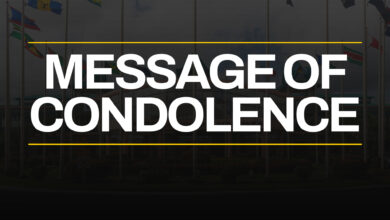WTO BANANA RULING DEVASTATING BLOW TO VULNERABLE CARIBBEAN ECONOMIES
Region’s Banana-Producing Countries Risk being Squeezed out of Market
CHRIST CHURCH, BARBADOS – Caribbean banana exporting countries have reacted with alarm to a ruling handed down Monday (August 1) by World Trade Organization (WTO) Arbitrators’ against the EC proposed tariff of €230 per tonne on third country banana imports under its Tariff Only system, that states it would not maintain total market access for MFN banana suppliers.
Regrettably, the arbitration panel did not make clear what it would consider to be an adequate banana tariff, as had been hoped.
In recent years, there has been an erosion of trade preferences, most graphically illustrated by changes in the EU banana regime; the effects of which have resonated most acutely with small, vulnerable Caribbean countries. The economies of the Windward Islands, for instance, are highly dependent on bananas for export earnings, under preferential access to the European market. No appreciation was given in the ruling to the fact that for the Africa Caribbean Pacific (ACP) in general, the European market provides the sole market for bananas, while the MFN producers dominate the global market. It would be an unacceptable short shrift for Caribbean banana-producing countries to be squeezed out of the European market, should the tariff be set too low. This would have dire consequences, especially for the rural poor, for whom an agricultural way of life is ensconced in their communities.
The Arbitrators’ ruling against European Union plans to overhaul its import rules for bananas underscores the ACP’s ongoing concerns about the marginalization of vulnerable economies within the global trading system, which in this case puts at risk the continued viability of the banana export industry in this grouping. In the Caribbean, banana-producing countries are very small, and their economies extremely dependent on the export of this fruit. The viability of the banana industry in these countries is now under threat, at a time when preferential treatment of another key commodity export – sugar – is under fire, following plans unveiled by the European Commission June 22 for an overhaul of the Common Market Organisation for sugar.
Reacting to the Arbitrators’ ruling, Prime Minister of St. Vincent & the Grenadines Dr. The Hon. Ralph E. Gonsalves – who is CARICOM’s Lead Prime Ministerial Spokesperson on Bananas – noted: “the quota arrangements that have been in place in one form or the other for several decades have enabled the Windward Islands to trade in a commodity that would otherwise have been impossible and benefited Latin American suppliers, who currently account for 75% of EU imports, by providing them with fairer and more remunerative prices than can be obtained in other major markets.”
“What is at stake for Caribbean-banana producing countries is secure access to the European market, at remunerative prices. A threat to secure market access puts at risk the livelihoods of tens of thousands of families in the Caribbean,” said Director General of the Caribbean Regional Negotiating Machinery (RNM) Ambassador Dr. Richard Bernal. “The banana industry has a multifunctional role in the Caribbean, especially in more impoverished rural areas,” Ambassador Bernal emphasized.
The European Commission said that the Community planned to maintain preferential access to banana imports from ACP countries, despite the Arbitrators’ ruling against the proposed new tariff on bananas.
The European Commission will now initiate consultations with the Interested Parties within the next 10 days, indicating that the intention remains to have a tariff only system in place January 1, 2006, as agreed at the WTO Doha Ministerial in 2001.
Another arbitration procedure can be requested by either side, if they are unable to reach consensus on a new tariff, the outcome for which would be binding. However, this process must respect the terms of the Cotonou Partnership Agreement Waiver, and here specifically the timetable of allowing the new tariff only regime to be implemented in January of next year.
It is regrettable that these negotiations will take place essentially between the EU and the Latin American MFN countries, as so much is at stake for the Caribbean’s banana trade based on the outcome of those deliberations.
It is crucial that any second arbitration result in a solution which will preserve ACP market access. In this vein, Prime Minister Gonsalves has urged the ACP and Latin American banana producing countries to intensify their joint search for a fair and lasting solution because whatever arrangement is introduced it must guarantee remunerative prices and adequate market access for all.
Background
Nine Latin/Central American countries – Brazil, Costa Rica, Colombia, Ecuador, Guatemala, Honduras, Nicaragua, Panama and Venezuela – had challenged the EU at the WTO in March and April, seeking WTO arbitration following failed consultations. The present arbitration was initiated pursuant to the procedures set out in the Annex to the waiver decision with respect to Article I of the General Agreement on Tariffs and Trade 1994 contained in the document “European Communities – The ACP-EC Partnership Agreement, Decision of 14 November 2001” (the “Doha Waiver”).
The EU agreed in 2001 to move from a complex import system, based on a combination of tariffs and quotas for MFN bananas, to a tariff only regime – by January 1, 2006. An import duty of €230 per tonne was proposed by the EU in January this year, to replace the existing commitments in the EC Schedule, in the form of a bound duty of €680 per tonne with a quota of 2,200,000 tonnes subject to an in-quota rate of €75 per tonne.
CARICOMPress ReleasesWorld Trade Organisation





